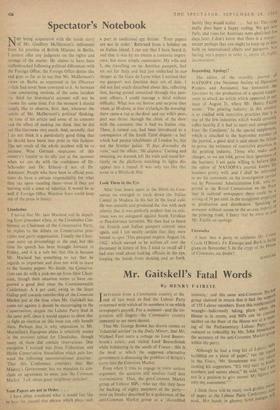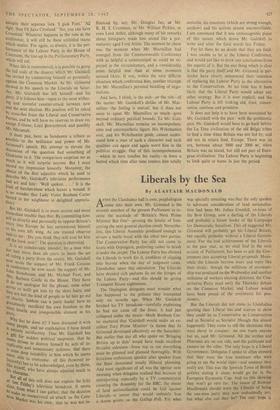Mr. Gaitskell's Fatal Words
By HENR FAIRLIE
IEtl;11,11NED from a Communist country at the end of last week to find the Labour Party concerned with which of its members is on which newspaper's payroll. For a moment—and the im- pression still lingers—the Communist country appeared to me more decent.
That Mr. George Brown has drawn money as `industrial adviser' to the Daily Mirror; that Mr. Michael Foot rents a cottage on Lord Beaver- brook's estate, and visited Lord Beaverbrook while holidaying in the south of France: this is the level at which the supposed alternative government is discussing the problem of Britain's entry into the Common Market.
Even when it tries to engage in more serious argument, the question still resolves itself into recrimination. Thus, the pro-Common Market group of Labour MPs---who say that they have ihe backing of eighty members of the party-- were on Sunday described by a spokesman of the anti-Common Market group as a 'discredited minority,' and this same anti-Common Mail'et group claimed in return that it had the suPP°a1.1 of 155 Labour members. Even this mathenla wrangle—ludicrously taking place whcrl tele d House is in recess, and MPs can be coun .neither on the floor of the House nor at a nlec.is mg of the Parliamentary Labour Part.V—"*. reduced to imbecility by Mr. John Stonehouse' the secretary the ecretapryarot3f.the anti-Common Marker .gr
within lljP
scribbled tAblbt lheodu Sohn he phieldcea En the Times, 'Mr. Stonehouse was coy' naming his supporters. "It's very easy to b3liat olfo npga pliesrt o ran a nL a tblio:3 rrlkp1,01:ristt
numbers and names about," he said, -but an~
not in a position to give names. MY figure'' only my assessment."' I think there will be many such grubby PieCe,:t of paper at the Labour Party Conference nc:„ week. Hit hands in PI --oomv hotel lounges 01"
THE SPECTATOR, SEPTEMBER 28 compile their separate lists. 'I pick Foot.' All Crossman.' Whatever happens in the vote at the right, then I'll have Crosland."No, you can have conference, it will still be these scribbled teams which matter. For again, as always, it is the per- formance of the Labour Party in the House of Commons, the line-up in the Parliamentary Party, Which will tell.
When this is remembered, it is possible to grasp the full scale of the disaster which Mr. Gaitskell has invited by committing himself so personally against the Common Market. As Mr. Grimond showed in his speech to the Liberals on Satur- day, Mr. Gaitskell has left himself—and his Party, if it follows him—open to the most wither- ing and scornful counter-attack between now and the next election. His position will be raked by cross-fire from the Liberal and Conservative Parties, and he will have no reserves to draw on, except Tribune, Lord Beaverbrook and possibly Mr. Nkrumah.
(I must pay, here, as handsome a tribute as Possible to the brilliance and power of Mr. Grimond's speech. His attempt to elevate the discussion of the question had something of Gladstone in it. The comparison surprises me as much as it will surprise anyone. But I must record my impression honestly. Moreover, the choice of the first adjective which he used to describe mt.. Gaitskell's television performance had Wit and bite : 'Well spoken. . . .' It is the kind of hatchet-blow which leaves a wound. It Is no wonder that Lady Violet Bonham Carter turned to her neighbour in delighted apprecia- tion) But Mr. Gaitskell is in more serious and more immediate trouble than that. By committing him- self so directly and personally to oppose Britain's e. nlry into Europe he has surrendered himself to his own left wing. As one trained observer said to me: `Do you think they will ever let him °lithe hook now?' The question is rhetorical. It is an unbelievable blunder, by a man who has had more than six years to learn the art of ruling a party from the centre. Mr. Gaitskell °W needs the support of Mr. Frank Cousins in conference; he now needs the support of Mr. John Stonehouse, and Mr. Michael Foot, and Mrs Barbara Castle in the House. They have do not apologise for the phrase; none other serves so well) got him by the short hairs, and o'ney are not the kind of people to let him go out f r i.ihiroily Seldom can a party leader have so
sacrificed his own freedom to the most
hostile and irresponsible element in his Party.
manyPeoPle, and no explanation I have heard a entirely satisfactory. That Mr. Gaitskell has seegut for sudden political ineptness; that he isx p _leable and unnecessary rashness; that there ms driven to destroy himself by acts of in- ne7e deep instability in him which he seems 'able to overcome : all this (however re- like lY)tantlY) has to be acknowledged, even by those, his character. who have always admired much in "nracter.
i.atst all of this still does not explain the folly clear Friday's television broadcast. It seems ' froth what I can gather, that the decision .0 Ili, Mon unequivocal an attack on the Com- naarket was his own: that he was not in- fluenced by, say, Mr. Douglas Jay, or Mr. R. H. S. Crossman, or Mr. William Pickles, or even Lord Attlee, although many of his remarks about foreigners made him sound like a pre- maturely aged Lord Attlee. The moment he chose was the moment when Mr. Macmillan had emerged from the Commonwealth Conference with as helpful a communiqué as could be ex- pected in the circumstances, and a considerably more helpful one than at some moments seemed likely. It was, within the very difficult situation which confronted him, another triumph for Mr. Macmillan's personal handling of nego- tiations.
And here, I think, is the nub—or the rub—of the matter. Mr. Gaitskell's dislike of Mr. Mac- millan—the feeling is mutual, but it does not seem to upset Mr. Macmillan so much—goes beyond ordinary political bounds. To Mr. Gait- skell, Mr. Macmillan remains an incomprehen- sible and unsympathetic figure. His Wykehamist soul, and his Wykehamist pride, cannot under- stand how a man of such a character and such qualities can again and again worst him in the political struggle. Out of this incomprehension —which in turn touches his vanity—is born a hatred which time after time renders him totally unstable, his emotions (which are strong enough, anyhow) and his actions almost uncontrollable. I am convinced that it was unmanageable pique of this nature which drove Mr. Gaitskell to write and utter the fatal words last Friday.
For let there be no doubt that they are fatal. I was unable to be at the Liberal Conference, and would not like to draw any conclusions from the reports of it. But the one thing which is clear is that the party itself and Mr. Grimond in par- ticular have clearly announced their intention of replacing the Labour Party as the alternative to the Conservatives. At no time has it been likely that the Liberal Party would adopt any other strategy. But it is now explicit, and the Labour Party is left looking old, tired, conser- vative, cautious and primitive.
It does not help it to have been associated by Mr. Gaitskell with the past : with the prehistoric past. Mr. Gaitskell would have to go back before the La Tene civilisation of the old Belgic tribes to find a time when Britain was not fed by, and did not in return feed, Europe. There was an era, between about 5000 and 2000 ac, when Britain was an island, but still not part of Euro- pean civilisation. The Labour Party is beginning to look quite at home in just the period.



































 Previous page
Previous page